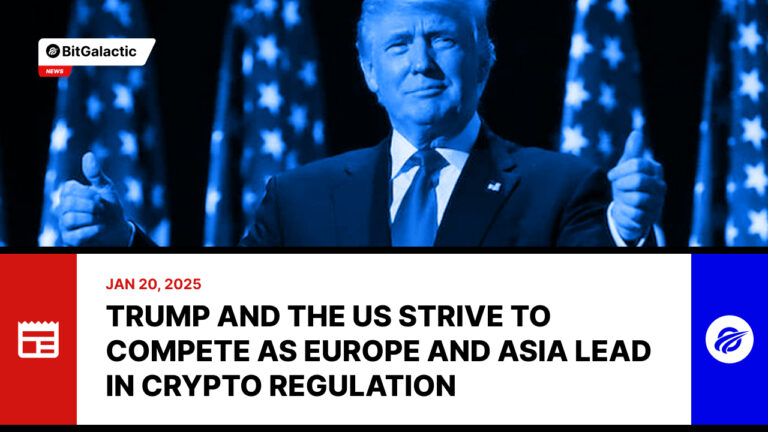Trump and the US Strive to Compete as Europe and Asia Lead in Crypto Regulation.
In 2024, President-elect Donald Trump initiated pro-crypto campaign promises aimed at positioning the United States as the “crypto capital of the world.” However, the country faces a significant challenge: catching up to the advanced regulatory frameworks established by Europe and Asia.
Over the past four years, regions like the European Union, the UK, and Asian nations, including South Korea and Singapore, have implemented robust measures to combat fraud, establish licensing standards, and provide oversight for a crypto market now valued at $3.7 trillion.
With Trump set to take office, blockchain analyst Noelle Acheson predicts a global acceleration in regulatory clarity. In her Crypto is Macro Now newsletter, Acheson remarked, “Trump’s win could trigger an international scramble to establish crypto market frameworks, as nations fear being left behind. The race is real.”
BitGalactic’s Take:
While Trump’s promises sound ambitious, they reflect an urgent need for the US to engage with the fast-evolving crypto landscape. A cohesive regulatory framework is critical—not only for fostering innovation but also for competing on a global stage where nations like Singapore and South Korea are already miles ahead.
Global Players Making Moves
The UK
The UK’s journey toward crypto regulation has been tumultuous. Former financial minister Rishi Sunak championed making the UK a crypto innovation hub, pushing legislation through Parliament to rival the EU’s Markets in Crypto-Assets (MiCA) regulation. However, a snap election disrupted progress.
Keir Starmer’s Labour government, now in power, aims to streamline the regulatory process by 2025. Ian Taylor, board adviser to CryptoUK, noted frustration with the UK’s lagging position but expressed hope for progress under the new administration.
BitGalactic’s Insight:
The UK’s regulatory inconsistency could undermine its ability to attract crypto investment. Stable, clear policies are crucial for businesses looking to expand in markets with legal certainty. The competition with the EU highlights the stakes involved.
South Korea
South Korea has long restricted institutional crypto trading, but that may soon change. The Financial Services Commission (FSC) is collaborating with the Digital Asset Committee to open institutional trading for non-profits and explore the introduction of spot crypto ETFs.
South Korea’s infamous “Kimchi Premium” — the price gap in cryptocurrencies traded locally versus globally — underscores its market potential. The recent political crisis, which caused XRP prices to plummet, revealed lucrative arbitrage opportunities.
BitGalactic’s Take:
South Korea’s approach demonstrates how policy shifts can unlock institutional participation, potentially reshaping global crypto liquidity. The move toward ETFs signals its intent to become a major player in regulated crypto markets.
Malaysia
Malaysia’s Prime Minister, Anwar Ibrahim, is considering new crypto policies after consultations with UAE and Binance officials. Calling for swift adaptation, Anwar emphasized that Malaysia must modernize its financial systems to stay competitive.
BitGalactic’s Perspective:
For Malaysia, partnerships with established players like Binance could be a game-changer. However, success depends on whether the nation can strike a balance between innovation and regulation, avoiding pitfalls seen elsewhere.
Thailand
Thailand is exploring Bitcoin ETFs and sandbox initiatives in Phuket to allow Bitcoin payments for tourism. These measures aim to position the country as a digital asset hub.
BitGalactic Commentary:
Thailand’s focus on integrating Bitcoin into its tourism industry highlights how niche applications can drive adoption. By connecting crypto with a core economic pillar like tourism, the country is carving out a unique position in the digital asset space.
Singapore
Singapore has solidified its status as a crypto hub by granting licenses to major players like OKX, Upbit, and Anchorage. However, the Monetary Authority of Singapore remains strict, recently blocking access to Polymarket due to illegal gambling concerns.
BitGalactic Analysis:
Singapore’s dual approach—encouraging innovation while maintaining strict oversight—has made it a leader in crypto regulation. Other nations could learn from its balance of accessibility and enforcement.
Cambodia
Cambodia, traditionally restrictive on crypto, has softened its stance slightly by allowing financial entities to interact with tokenized assets and stablecoins. However, direct exposure to cryptocurrencies remains banned.
BitGalactic’s Insight:
Cambodia’s cautious approach reflects broader hesitations seen in emerging markets. Its incremental adoption of tokenized assets suggests a gradual entry into the global digital asset ecosystem.
Conclusion: The US at a Crossroads
As the global crypto race heats up, the US faces mounting pressure to develop a coherent strategy. While Trump’s administration may champion the industry, success depends on swift and effective regulation.
BitGalactic’s Final Word:
The US has an opportunity to regain leadership, but it requires aligning federal and state policies, fostering innovation, and learning from the successes and missteps of global counterparts. The next few years will be pivotal in determining whether the US can reclaim its position in the crypto world—or remain on the sidelines.
Share this post


